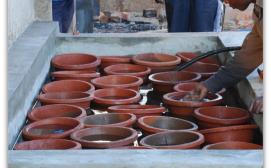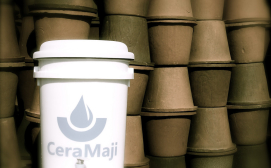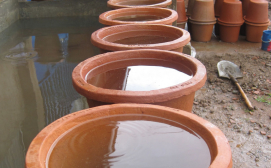Project Lead(s): Andre Isaac
Issue
An estimated 884 million people worldwide lack access to a safe source of drinking water, with approximately a third residing in Sub-Saharan Africa.
In rural Kenya, the main water purification technology available is boiling water but, for many Kenyans, this method is cost-prohibitive and limited by the availability of raw materials.
Solution
Innovative Canadians for Change (ICChange) has developed a ceramic water filter technology that is geared toward a resource-limited setting. The ceramic water filters (CWFs) are composed of local clay and an organic temper, which is burned off.
The products can remove 99.7% of coliform bacteria from local stream water and can provide clean drinking water for a family of five for three years.
ICChange has built and operated a CWF factory capable of producing several hundred filters per month.
The ICChange team’s objective was to create a social enterprise for marketing, sale and distribution of their CWFs at a minimally sustainable price, for long-term impact.
The team incorporated a new company in Kenya, Ceramaji Co., that operated as the sole customer of their CWF production facility in Kitale, marketing and selling filters at an affordable price to at-need populations.
Outcome
CeraMaji Co. is nearing full financial sustainability and was able to recoup more than 75% of the costs of CWF production and rely less on external funding.
The team projects it will achieve full sustainability within the next three years, while providing CWFs at an extremely affordable price (approximately $10 USD per filter for a family of five).
CeraMaji has successfully distributed more than 9,000 CWFs during the grant period, which have improved lives of more than 45,000 Kenyans.
Using local incidence and mortality data, the CeraMaji estimates that the CWFs have been responsible for preventing an estimated 2,500 deaths in children under the age of five from diarrheal illness.
Through marketing, education and trade show events, the team has helped to bring visibility to the importance of clean water in the local community.
CeraMaji has been able to establish important partnerships with the Kenya Ministry of Health, as well as several local and international NGOs operating in Kenya, Uganda, Tanzania, Ethiopia and Ghana. Through these partnerships, they have begun to enter markets in other parts of East Africa, which has paved the way for expansion and further economies of scale.
The next step is to complete the construction of a larger, more centralized CWF factory that can better match the CeraMaji demand and achieve economies of scale in production through streamlining of production costs.
This will be a coordinated effort between ICChange and several key partners, including AMREF Kenya and UNICEF Kenya, with anticipated completion by December 2016.
ICChange plans to apply for transition to scale funding after completion of the new CWF factory.



